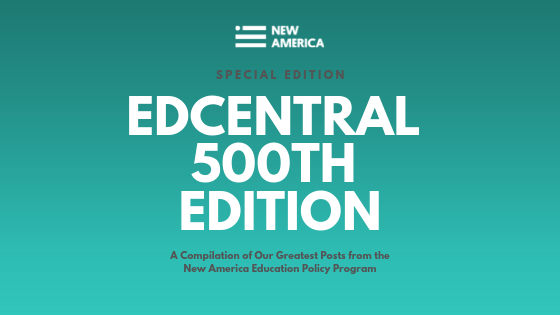EdCentral Celebrates Its 500th Edition
To recognize our weekly newsletter's 500th post, we reflect on how education policy has evolved and what EdCentral's contributions were to that evolution.
Blog Post

March 27, 2019
Welcome to the 500th edition of EdCentral. A lot has happened since we began writing this newsletter, some of it heartening, some of it frustrating, all of it fascinating.
There has been real progress in providing more young children with the care and education they need. States and municipalities are moving toward full-day kindergarten and universal Pre-K while developing better ways to finance early childcare. But we still have a patchwork system that leaves too many families and children in the lurch. The educators we rely on during the crucial early years often don’t get the training and compensation they need. Halting steps forward need to cohere into a national movement.
As researchers and educators, we know that schools are only as good as the teachers they employ. We’ve traveled the country to learn from local districts that are investing in the long-term growth of their educators. We also see how the nation’s changing demographic landscape is creating the need for new skills and classroom methods. There’s a great opportunity to use students’ diversity of language background to improve learning for everyone, but only if schools can help educators from their local communities acquire the skills and credentials they need.
The modern economy is treacherous and uncertain, which is why we want to ensure that everyone has the chance to access education and earn credentials after high school. For some people that means the traditional four-year college track, which they should be able to afford without taking out ruinously large student loans. For others, it might mean a two-year degree, a certificate, or an apprenticeship program that starts in high school and continues in partnership with local employers and colleges. Whatever the right path -- and there are many -- the government needs to make sure that student and public dollars are well-spent. We’ve been tireless consumer advocates in education, and that fight will continue.
Allocating educational resources is difficult, and it seems like there’s never enough to go around. That’s why we’re always on the lookout for innovation, which can mean technology, but doesn’t have to. New ideas come in many forms -- better ways to design organizations and structure professions, new methods of empowering parents and students. We’re enthusiastic about the opportunities technology creates to bring more great education to more people, at home and abroad, but we’re also wary of false promises and quick fixes. Human intelligence is the center of human learning and always will be.
The one constant over the last six years has been you, our readers, the community we rely on to keep us honest and inspired. Thank you for your time, your enthusiasm, and your commitment to the ideal of great education for all. We can’t wait to write 500 more.

Read the full 500th edition here.
Kevin Carey is the Education Policy Program Director and Vice President of Education Policy and Knowledge Management for New America.
Enjoy what you read? Subscribe to our newsletter to receive updates on what’s new in Education Policy!